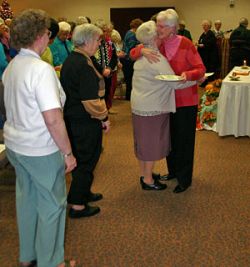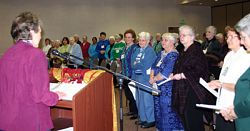Sisters of Holy Cross meet in Salt Lake to solidify corporate stance on nonviolence

SALT LAKE CITY — The Diocese of Salt Lake City, in which more than 1,374 women religious of the Congregation of the Holy Cross have served, was one of three dioceses in the United States where members of that congregation have met over the last two weeks to redefine their mission. The sisters used three North American Assembly 2006 meetings to solidify their corporate stand on nonviolence and work for peace throughout the world. Two years ago, "with the U.S. -led wars in Iraq and Afghanistan in full tilt and ‘war on terrorism’ rhetoric running high, the sisters in the North American novitiate proposed that the Sisters of the Holy Cross take a corporate stand against violent responses to conflict..." the pre-assembly booklet prepared for the sisters said. "As they reflected on the multiple forms of violence in society, they began to articulate a proposed stand opposing violence in all its forms and espousing a stance of nonviolence." The materials presented in the booklet in support of the corporate stand included: reflection on experiences of violence as submitted by the Sisters of the Holy Cross around the world; social analysis of the issues of violence as interpreted by the Sisters’ Congregation Justice Committee (CJC); theological reflection, including passages from sacred Scripture and Catholic social teaching; and plans for informed action. The sisters were asked to consider the booklets’ contents, including the proposed corporate statement, and vote on the proposed stand online between Nov. 1 and Nov. 10. The assembly meetings were then designed make action plans. In the opening Mass for the Salt Lake City assembly, Diocesan Administrator Msgr. J. Terrence Fitzgerald reminisced about the work accomplished in the local church by the more than 1,300 members of the Congregation who have served in the Diocese of Salt Lake City. "From their arrival in 1875, the sisters made the church present throughout the scattered Mormon communities of this territory," Msgr. Fitzgerald said. Citing the Congregation’s response to the local needs they found here, their presence, and his personal reflections, Msgr. Fitzgerald spoke of the Congregation’s service in the fields of education in diocesan schools, health care and administration at Holy Cross Hospital and Jordan Valley Hospital. He recalled their response to the needs of children orphaned by mining disasters at St. Ann’s Orphanage, people with AIDS/HIV at Holy Cross Hospital, and their leadership in meeting the needs of women and children through Holy Cross Ministries. Recalling sisters’ individually, he spoke of their work in Newman Centers throughout the diocese and the loving care they rendered to elderly and ill priests and bishops of the Diocese of Salt Lake City. The faith-filled presence, generosity, and willingness to respond to local needs that the 1,374 Holy Cross women brought to the people of Utah speaks dramatically of their impact," Msgr Fitzgerald said. "I consider this one of the most marvelous untold stories of our local church." In an interview with the Intermountain Catholic, Holy Cross Sisters Alberta Kramer (76), Jane Chantal (76), and Evelyn Joyce (78), all of whom have served in the Diocese of Salt Lake City, spoke of their memories of the diocese and her people and the changes they have seen in the Congregation of the Holy Cross over the years. For many years, the charisms of the Congregation of the Sisters of the Holy Cross were education and health care. "I taught at Judge Memorial from 1979-1990," said Sr. Evelyn, who now lives at St. Catherine’s by the Sea in Ventura, Calif. "Utah was a home base for us from 1887 to 1998." Sr. Jane helped open Bishop Glass Elementary School on Salt Lake City’s west side in 1954 and 1955. Then, she went into nursing, playing a vital role in opening the psychiatric care unit at Holy Cross Hospital. Sr. Jane has been serving in Uganda and other parts of Africa since 1981. She and Sr. Albertine lived together in Salt Lake City fron 1961-1963. From 1980-1988, Sr. Albertine served as a chaplain at Holy Cross Hospital, having been a teacher before that. "Utah was the most fun," said Sr. Evelyn, and Sr. Janes added, "We left a bit of ourselves here." "It wasn’t as if we were either teaching or nursing sisters," Sr. Jane said. "So many of us did both." "Today, our charisms have changed," said Sr. Albertine. "We are working with marginalized people; those on the fringes of society." Sr. Jane said their work today is enhanced by the Congregation’s committment to "growing right relationships" among themselves, within the community, in the world, and with nature. "We are developing in new ways, making efforts to broaden our understanding." For Sr. Evelyn, although the Congregation is greying, "we are bearers of reconciling hope. We are no longer identified with institutions like hospitals and schools. The needs of the world are much more broad, and we’re trying to meet those needs." Sr. Jane said that includes becoming involved in issues of immigration and justice. "Our demographics are interesting," said Sr. Albertine. "Years ago, the majority of our sisters were from the U.S., and going out to mission in other countries. Today, there are fewer of us in the U.S., and more sisters from South America, Asia, Africa, and Mexico." "It is one of our great signs of hope," said Sr. Jane. "Our diversity is challenging us to new ministry in the church and in the world." "It’s exciting and challenging," Sr. Alberta said. The Congregation currently has 58 sisters in formation worldwide. Sr. Evelyn brought the conversation back to the Congregation’s statement of nonviolence, which defines nonviolence as "constitutive in the message of Jesus." The Congregation’s stand disallows discrimination of any kind, and calls for the generation of an "equitable economic system for all." Not only does their stand oppose violent responses to conflicts, "particularly war and terrorism," it opposes denial of human rights, economic and military policies that exacerbate poverty and inequality, and "degradation and destruction of natural resources and ecosystems." "Now, we have to develop new ways to live that out," she said. "It’s a process we’ve pledged to undertake that clarifies our mission in the world." Reflecting on their own vocations, the women said when they entered religious life, there were few options for young women. "There were no leadership positions for lay women in the church," Sr. Jane said. "The Sisters were the leadership. We opened the doors for lay women in leadership, and now they are opening the doors for us to change the world." A their closing Mass, the homilist spoke of following Jesus through the Land of Israel, taking care of people as he did, and reaching out to those in need. "In God’s eyes, the size of the gift matters not; the size of the giver’s heart does."
© Copyright 2025 The Diocese of Salt Lake City. All rights reserved.


Stay Connected With Us